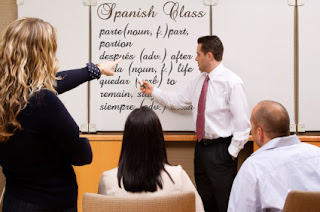
If the school group leader requests it - this tour is done completely in Spanish. Students are challenged to speak Spanish while they travel. Student travelers will eat locally made Puerto Rican food, learn Salsa dancing from locals, play dominoes and briscas, dine and converse with local guides and residents and swim and lodge where locals enjoy the beach. Student travel groups will tour San Juan and Ponce, two of the largest cities in Puerto Rico, and also have the opportunity to explore rural areas, like the pristine beaches of Boquerón and Luquillo, the fishing village La Parguera, and El Yunque, the only tropical rainforest in the United States.
1. Podcasts
There are dozens of podcasts online, just Google "Spanish podcasts". You can learn a lot from all of them. However, if you want to improve your speaking skills, you should look for the conversational ones. Try to find a podcast with a transcription, because it's better to improve speaking skills if you can follow the speaker while reading transcription. You can find a lot of podcasts on iTunes. Make sure that the podcast isn't too difficult for you since it's not effective to listen to something which you can't understand.
2. Lingus.tv
Lingus.tv is a web TV which is devoted to teaching Spanish in a very fun way - by sitcoms. These sitcoms last a few minutes, have a transcription, subtitles, there's a translation and grammar notes. Thanks to this, improving your Spanish is very easy - read a transcription and try to imitate native speakers' pronunciation. If you don't understand something, check the translation. You can improve your accent as well as vocabulary. These videos have three levels of difficulty - beginner, intermediate and advanced so you should find something suitable for you no matter how long have you been learning Spanish.
3. Audiobooks
Buy a regular book and an audiobook with a native Spanish speaker. Firstly, listen to a passage pronounced by a native Spanish speaker, then turn on your microphone and read the same passage aloud. Listen to your pronunciation and compare it to speaker's one. Repeat this process at least a few times to make your pronunciation as close to native speaker's as possible. Then, do the same for the next passage and the next one and so on. You can find a lot of books and audiobooks in Spanish on Amazon or eBay. Maybe your local library have some Spanish books?
Don't be discouraged if progress is slow. You can't improve your Spanish speaking skills overnight. Try methods listed above and I'm sure that after some time you will be speaking a lot better than you do now. Be determined and practice regularly. Good luck!
There are dozens of podcasts online, just Google "Spanish podcasts". You can learn a lot from all of them. However, if you want to improve your speaking skills, you should look for the conversational ones. Try to find a podcast with a transcription, because it's better to improve speaking skills if you can follow the speaker while reading transcription. You can find a lot of podcasts on iTunes. Make sure that the podcast isn't too difficult for you since it's not effective to listen to something which you can't understand.
2. Lingus.tv
Lingus.tv is a web TV which is devoted to teaching Spanish in a very fun way - by sitcoms. These sitcoms last a few minutes, have a transcription, subtitles, there's a translation and grammar notes. Thanks to this, improving your Spanish is very easy - read a transcription and try to imitate native speakers' pronunciation. If you don't understand something, check the translation. You can improve your accent as well as vocabulary. These videos have three levels of difficulty - beginner, intermediate and advanced so you should find something suitable for you no matter how long have you been learning Spanish.
3. Audiobooks
Buy a regular book and an audiobook with a native Spanish speaker. Firstly, listen to a passage pronounced by a native Spanish speaker, then turn on your microphone and read the same passage aloud. Listen to your pronunciation and compare it to speaker's one. Repeat this process at least a few times to make your pronunciation as close to native speaker's as possible. Then, do the same for the next passage and the next one and so on. You can find a lot of books and audiobooks in Spanish on Amazon or eBay. Maybe your local library have some Spanish books?
Don't be discouraged if progress is slow. You can't improve your Spanish speaking skills overnight. Try methods listed above and I'm sure that after some time you will be speaking a lot better than you do now. Be determined and practice regularly. Good luck!
No comments:
Post a Comment